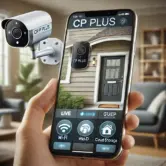
CCTV Camera Installation for Homes and Offices
How to Install CCTV Cameras in Your House or Office – By Mr. Dukaan Wala
Overview
CCTV installation is crucial, especially in this era where security is in high demand. It is no longer a luxury but an absolute necessity. Whether it’s a beautiful house, a busy shop, or an industrial estate, quality surveillance systems can deter incidents of burglary and vandalism while providing invaluable evidence in case such incidents occur.
This brings us to Mr. Dukaan Wala, who is best suited for trusted CCTV solutions. This supreme step-by-step guide will help you install CCTV for homes, businesses, and industrial sites. The time is now to secure your space, so let’s get started.
Why Use CCTV Cameras?
Before diving into setup tips, let’s quickly cover important design considerations for your CCTV system:
Crime Prevention: Goods and premises are protected from unauthorized access and damage due to the mere presence of surveillance cameras.
24/7 Monitoring: The property can be monitored around the clock, ensuring nothing is missed.
Evidence Collection: Recorded footage can be invaluable in case of an accident, security breach, or property damage.
Best Security: High-risk or isolated locations can be monitored to protect people and valuable assets.
CCTV Installation Guide: Step-by-Step Instructions
Selecting the Appropriate CCTV Camera System
The type of camera you use depends on the location and the level of security required. Different types of cameras are used in various conditions and environments:
Dome Cameras: Generally suitable for indoor settings; discreet and offer extensive coverage.
Bullet Cameras: Ideal for outdoor usage; weather-resistant with long-range capabilities.
PTZ (Pan-Tilt-Zoom) Cameras: Allow close inspection of strategic locations with adjustable view angles.
IP Cameras: Offer high-definition (HD) images and can be easily connected to the network. These cameras are ideal for professional and industrial settings.
Strategically Plan Your Camera Location
Proper camera placement ensures maximum coverage:
Residential: Front and back doors, driveways, and common staircases should be monitored.
Business/Corporate: Cameras should cover doors, windows, reception areas, and parking spaces.
Industrial: Hazardous areas, industrial machinery, and loading docks need supervision.
Ensure cameras are installed at a sufficient height to prevent tampering while capturing clear images.
Placing the Cameras
Follow these steps to secure the position of the cameras:
Identify the Position: Mark drilling holes for brackets or mounting devices.
Secure the Mount: Affix each camera with screws, ensuring it covers the intended field of view.
Cabling (For Wired Systems): Route cables carefully to protect them from damage and secure them along walls or within conduits.
Wireless Setup (if applicable): Ensure cameras have access to a strong Wi-Fi connection for reliable connectivity.
Connect the DVR or NVR
Every CCTV camera requires a recording device to capture and store footage:
DVR (Digital Video Recorder): Compatible with analog cameras only; must be hardwired.
NVR (Network Video Recorder): Best used with IP cameras; offers higher resolution and easier remote access.
Connect the system to a display (TV or monitor) to ensure camera feeds are viewable.
Set Up Camera Parameters
Adjust settings for optimal performance:
Resolution Settings: Adjust the DVR or NVR settings to provide clearer images, especially for HD or 4K cameras.
Motion Detection: Enable this feature to eliminate unnecessary recording.
Recording Schedule: Set specific recording times if 24/7 monitoring is not needed.
Remote Access: Allow mobile or web apps to monitor live feeds from anywhere.
Check Your Security System
Before completing your setup:
Walk-Through Inspection: Ensure there are no blind spots behind camera angles.
Recording Check: Confirm live feeds are saved properly on the DVR/NVR.
Network Test: If using IP cameras, verify the connection and remote access functionality.
DIY vs. Professional Installation by Mr. Dukaan Wala
A DIY approach may suit a small home or shop, but knowing when to seek professional help is essential. For larger commercial or industrial establishments, intricate wiring, advanced camera systems, and other configurations require a specialist.
I offer professional CCTV installation services to ensure every element, from wiring to camera positioning, is customized to perfection. We handle everything, from equipment recommendations to maintenance plans designed to keep your system running smoothly.
Special Considerations for Business & Industrial Settings
If you’re installing cameras in a corporate office, warehouse, or factory, consider the following:
Durability: Use weatherproof and vandal-resistant cameras for tougher environments.
Lighting: Floodlights or infrared cameras enhance visibility at night.
Data Security: Implement encryption protocols and secure firewalls to protect your network.
Key Tips for Home Security
For homeowners, peace of mind comes down to reliability and simplicity:
Regular Maintenance: Ensure camera lenses are clean, and check cables or batteries (for wireless cameras) regularly.
Footage Backup: Store critical recordings on the cloud or external drives.
Legal Compliance: Know local laws to avoid filming restricted zones.
Frequently Asked Questions
What is the easiest way to install CCTV cameras?
The installation process is simplified with a wireless plug-and-play system. Simply mount your cameras, connect to Wi-Fi, and configure settings through an app or computer.
Can I install a CCTV system on my own at home?
Definitely! Many systems are designed for DIY installation. However, if you’re unsure about wiring or advanced configurations, professional assistance ensures a proper setup.
Where should I place cameras to secure my business?
Focus on entrances and exits. Also, place cameras in reception areas and high-risk zones like server rooms and cash counters to prevent blind spots.
Which camera is best for industrial environments?
Weatherproof IP cameras with night vision are ideal. They provide high-resolution footage and durability in tough conditions.
Should I choose a DVR or NVR system?
DVR: Best for analog camera setups, usually older or budget-friendly systems.
NVR: Best for IP cameras, offering superior video quality and easier remote monitoring.
How do I access my CCTV cameras remotely?
Remote access is configured in device settings, requiring a stable internet connection. Most systems provide specific smartphone apps or web platforms for monitoring.
Secure Your Space with Mr. Dukaan Wala!
Are you ready to upgrade your security system? Trust Mr. Dukaan Wala’s complete CCTV services, including high-quality cameras and professional installation. Contact us today and enjoy the peace of mind that reliable surveillance brings!



